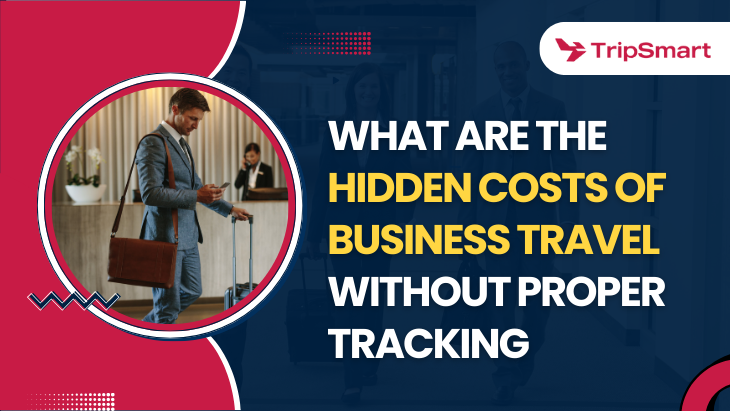In this age of global business connectivity, corporate travel continues to be a fundamental aspect of growth and prosperity. Companies depend on staff travel to see customers, attend industry conferences, establish networks, and conquer new markets. Yet, while business travel fuels opportunity, business travel & expense management is also highly costly. In order to maintain these costs in line, firms normally depend on managed travel policies, expense management tools, and tracking tools. However, the majority of firms still lag behind in having accurate business travel cost tracking.
On the surface, business trip expenses should be easy: air travel, hotel stays, meals, and taxis. But beneath these surface-level costs, there are a host of less-obvious costs hidden in the mix, which, if left unmonitored, can dismantle profitability and make financial planning more difficult. Without proper tracking methods in place, inefficiency, waste, and even regulatory non-compliance risk can be the byproducts.
This essay examines the unbudgeted costs of business travel that go untracked, breaking down how they occur, their effects on companies, and what measures businesses can take to reduce them.
1. Uncontrolled Spending and Expense Leakage
The most direct hidden expense of unmonitored business travel is unrestricted spending. Without tracking mechanisms, staff will reserve flights, hotels, or rental vehicles with vendors not in the company's preferred vendor contracts. These behaviors are referred to as "rogue bookings," circumventing negotiated corporate rates, and organizations end up paying much more than they should.
Moreover, small off-policy expenditures like premium food, avoidable upgrades, or overpriced ground transport go undetected. Individually insignificant, collectively these costs amount to considerable budget leakage in the long run.
Example:
An organization has a corporate deal with an airline for 15% concession on international travel. When employees book flights regularly outside the arrangement, bypassing the discount, the organization loses not only the discount but also can't accurately track overall travel expenditure.
Implications:
Rising travel budgets with no accountability.
Limited capacity to negotiate future vendor contracts owing to the absence of consolidated data.
2. Administrative Inefficiency and Burden
The other silent cost is in the time and resources squandered on manual work. Without having travel expenses monitored through integrated systems, employees end up spending hours completing paper forms, attaching receipts, and submitting claims. Finance teams, therefore, need to check these expenses manually, verifying each line item.
This inefficiency uses productive time that could otherwise be spent on strategic activities. This hidden cost is not only monetary but also an opportunity cost: each hour of manual expense administration is an hour not used for innovation or top-line work.
Implications:
Lowered employee productivity.
Slowed reimbursements, resulting in staff dissatisfaction.
3. Lost Opportunities for Cost Optimization
Accurate tracking of travel expenditures creates worthwhile information. This information can be used to recognize patterns, streamline travel policies, and drive deals with airlines, hotels, and rental car companies. Organizations are unable to tap into data-driven decision-making without such tracking.
For instance, an organization that does not know how often employees travel to a given city is unable to negotiate corporate rates with hotels in the said city. Likewise, without the study of travel frequency, companies will be unable to invest in loyalty programs that result in long-term savings.
Hidden Cost: It results in overspending, lost discounts, and unused negotiation leverage.
4. Compliance and Legal Risks
Business travel tends to be subject to intricate legal and tax laws. If not properly monitored, organizations risk unwittingly breaking tax laws, immigration laws, or labor laws. For example, international traveling employees who are abroad for longer periods of time might unwittingly establish tax residency problems for themselves or their organization.
Besides, inaccuracy in tracking expenses can lead to non-compliance with a company's internal travel guidelines. Not only does this increase expenditure but also subject companies to audit danger. In financial audits, poor or incomplete travel records can harm credibility and attract penalties.
Example:
If a worker remains in another country for over 183 days without the company's authorization, the company might incur unforeseen corporate tax liabilities within that country.
Implications:
Legal penalties and fines.
Heightened reputational risk as a result of non-compliance.
5. Duty of Care and Traveler Safety
Apart from monetary worries, organizations are responsible for the duty of care of workers on business travel. Without tracking devices, it is hard to keep track of workers' whereabouts and offer timely help in case of situations like natural disasters, health emergencies, or political disturbances.
This failure not only jeopardizes employees but also subjects the company to lawsuits and damage to its reputation. Furthermore, employees who don't feel supported during travel can lose faith in the organization, and their morale and productivity decrease.
Hidden Cost: Though often not a monetary cost, the cost of neglecting employee safety can be realized in litigation costs, higher insurance costs, and talent turnover.
6. Fraud and Misreporting
Untracked business travel provides a setting in which fraudulent claims for expenses can go unnoticed. Workers can inflate costs, double-submit receipts, or claim their own personal expenditures on company expense accounts. With no automated scrutiny, these practices can go unchecked.
Even in the absence of intentional fraud, manual errors can drive up costs. For instance, filing receipts in different currencies without conversion can skew records.
Implications:
Losses in terms of money through fraudulent reimbursements.
Strained employee-management trust.
7. Hidden Influence on Employee Satisfaction
Though undervalued, inefficient tracking systems have indirect influence over employee satisfaction. Frustration is caused by delayed reimbursement because of manual procedures or misplaced receipts. Employees would also feel unsupported if their personal preferences (e.g., seating, accommodation, or dietary requirements) are repeatedly ignored because of no centralized tracking.
Underperforming employees are less efficient and prone to disengagement. Over time, this can raise turnover levels, resulting in recruitment and training costs—hidden costs seldom attributed directly to ineffective travel management.
8. Ineffective Budget Forecasting and Planning
Correct forecasting relies on trustworthy data. Without monitoring, businesses cannot anticipate future travel costs. Consequently, budgets can either be underestimated (resulting in overspending) or overestimated (holding back funds that may otherwise be utilized).
This is a source of uncertainty that makes planning difficult and decreases organizational responsiveness. In industries with tight margins, such financial inefficiency can mean profit or loss.
Hidden Cost: Loss of financial control and inability to manage resources.
9. Blind Spots in Sustainability
Contemporary organizations are being subjected to mounting pressure to implement sustainable travel practices. Tracking systems allow businesses to compute carbon emissions of flights, ground transportation, and accommodation. Without access to this information, businesses are unable to measure or minimize their environmental footprint.
This generates a latent expense in the form of a lost image. Clients, financiers, and controllers increasingly prefer organizations dedicated to sustainability. Organizations that cannot show eco-friendly touring methods might miss out on business prospects and stakeholder confidence.
10. Strategic Disadvantages
Finally, not monitoring travel expenses detracts from the capacity of organizations to leverage travel as a strategic asset. When well managed, business travel can improve employee performance, improve client relationships, and spur growth. But without insight into cost and value, companies have no way to measure the return on investment (ROI) of their travel initiatives.
This lack of knowledge has an underlying cost of lost competitive edge. Competitors with strong systems for tracking travel can minimize costs, improve employee satisfaction, and link travel to strategic objectives—placing poorly managed firms behind the curve.
Solutions to Avoid Hidden Costs
In order to stay clear of these hidden costs, organizations need to embrace a proactive stance on travel management:
Install Comprehensive Travel Management Systems (TMS): Automation of booking, expense reporting, and tracking eliminates human error and minimizes effort.
Consolidate Data: Centralized data platforms give visibility to overall expenditure, allowing for improved analysis and vendor negotiations.
Improve Policy Compliance: Integrating policies into booking tools avoids uncontrolled spending.
Increase Duty of Care Initiatives: Real-time monitoring and emergency assistance tools guarantee the safety of travelers.
Encourage Transparency: Transparent policy communication and frequent reporting instill trust and accountability.
Leverage Analytics: Predictive insights can maximize budgets and enhance decision-making.
Sustainability Integration: Carbon tracking supports companies in reaching environmental targets.
Conclusion
The TripSmart overt expenses of business travel represent merely the tip of the iceberg. Underlying the surface are many concealed expenses ranging from unmanaged spending and administrative waste to compliance issues, employee discontent, and lost strategic potential. In the absence of tracking, organizations not only lose money but also time, trust, and competitive edge.
In a world where transparency, efficiency, and sustainability are the keys to long-term success, neglecting such hidden costs is an affront that no organization can afford. Through investment in the right travel tracking systems and policy formulation that keeps up with contemporary business realities, firms can reposition travel as an enabler of growth rather than an expense.
Eventually, the actual price tag of untracked business travel is not economic—it is lost trust, lost productivity, and missed opportunity. Realistic tracking, then, is not merely a cost issue but a strategic imperative for businesses in the global economy.





Leave a reply